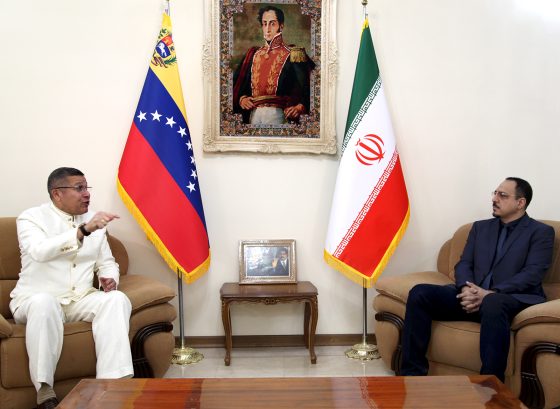“Strengthening Transit Infrastructure and Developing International Corridors are ECO’s Key Priorities” Says Dr. Asad Majeed Khan
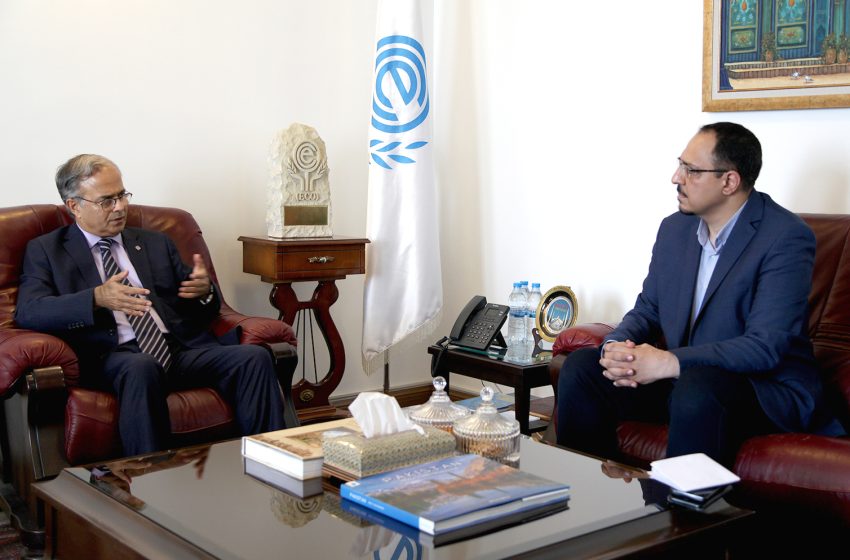
The 17th ECO Summit held in July, 2025, in Khankendi, Azerbaijan, under the theme “New ECO Vision for a Sustainable and Climate Resilient Future”. This summit provided an important opportunity for the leaders of the member states to review development priorities and future strategies in light of geopolitical and geoeconomic developments. In order to review the achievements of this summit and also to examine the competitive advantage of ECO organization over other regional organizations active in Asia and the Middle East, we have conducted an interview with Dr. Asad Majeed Khan, a prominent diplomat at the Ministry of Foreign Affairs of Pakistan and Secretary General of the Economic Cooperation Organization (ECO), which you can read in detail below:
AVA Diplomatic’s Exclusive Interview with
Dr. Asad Majeed Khan, Secretary General of the Economic Cooperation Organization (ECO)
What were the main objectives of holding the 17th ECO Summit and what were the most important topics on its agenda?
The summits provide an important opportunity every two years at the leadership level to review the work and priorities of the Organization and to provide guidance for the future, taking into account the geopolitical and geoeconomic developments in the region. The 17th ECO Summit, held on July 3-4, 2025, in Khankendi, Azerbaijan, under the theme “New ECO Vision for a Sustainable and Climate Resilient Future,” discussed a wide range of issues, including enhancing trade and transport connectivity, promoting renewable energy cooperation, advancing climate resilience and strengthening ECO institutions. The Summit assumed special significance as a number of important proposals and suggestions were made by the leaders that would enrich the “Strategic Objectives of Economic Cooperation 2035”, a vision document that is under preparation, to steer the Organization for the next ten years.
To what extent did this summit address the ongoing geopolitical crises in the region and how have these developments influenced ECO’s agenda?
As an economic organization, ECO is primarily focused on development issues, aiming to enhance and deepen regional integration through trade expansion, transport connectivity, environmental cooperation, and more. However, given the current geopolitical environment and a host of crises affecting the region, the leaders clearly articulated their concerns on a number of issues, including the condemnation of Israeli aggression against Iran and atrocities in Gaza, among others, while also reaffirming the importance of unity, solidarity, and regional peace and stability as indispensable prerequisites for the collective development of the region.
What specific initiatives or agreements were proposed at the Summit to enhance road and rail connectivity among ECO member states?
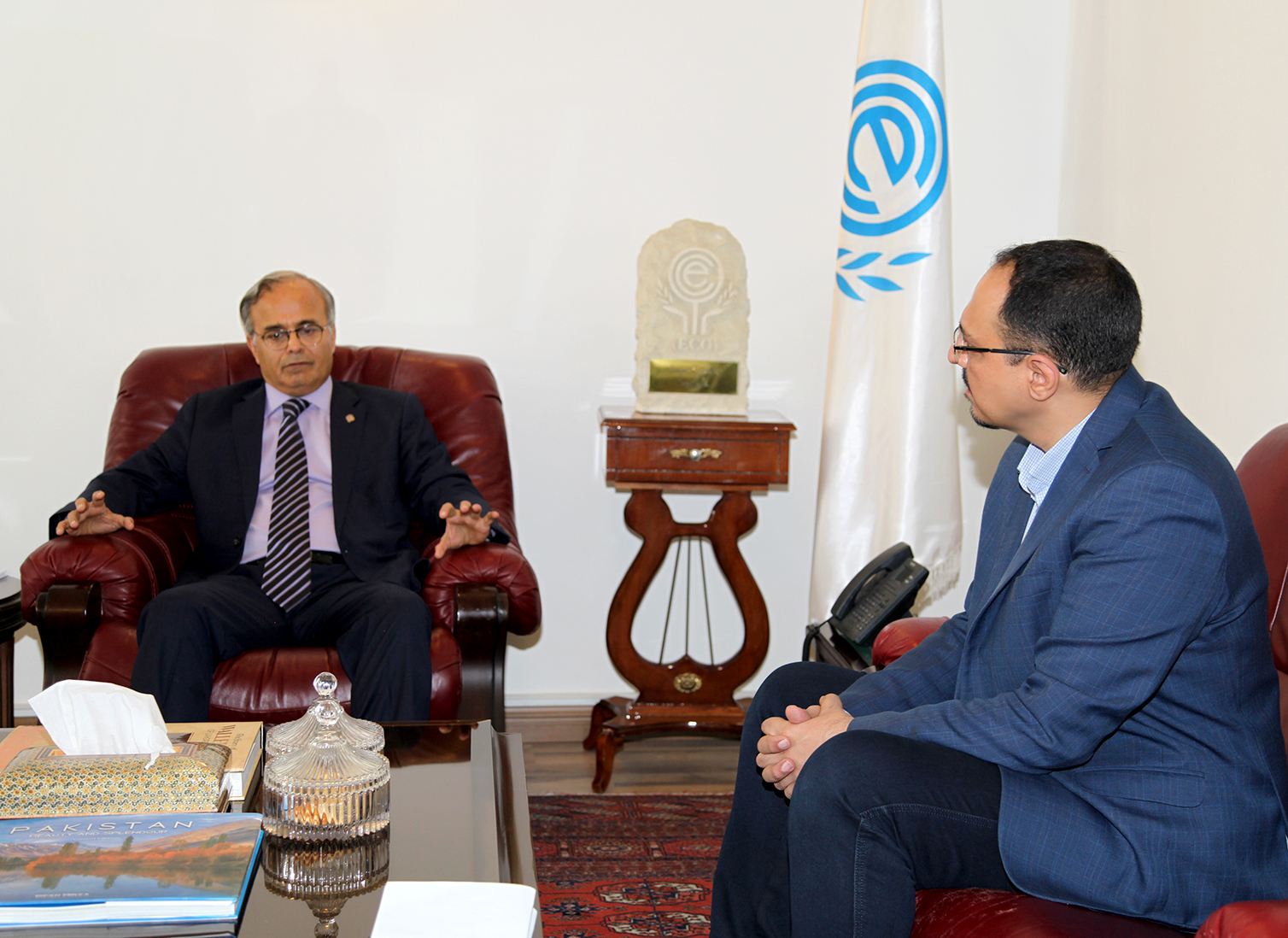 Enhancing regional connectivity is an overarching priority for ECO. During the Summit, a number of key initiatives were highlighted and proposed to strengthen transit infrastructure among Member States. These initiatives include developing international corridors, modernizing ports and border processes, streamlining multimodal transport, improving digital logistics systems, and prioritizing green transport corridors to promote sustainable, low-emission infrastructure. The discussions also focused on integrating physical infrastructure, using technology more effectively through greater digitalization, and pursuing environmental sustainability to foster regional economic growth.
Enhancing regional connectivity is an overarching priority for ECO. During the Summit, a number of key initiatives were highlighted and proposed to strengthen transit infrastructure among Member States. These initiatives include developing international corridors, modernizing ports and border processes, streamlining multimodal transport, improving digital logistics systems, and prioritizing green transport corridors to promote sustainable, low-emission infrastructure. The discussions also focused on integrating physical infrastructure, using technology more effectively through greater digitalization, and pursuing environmental sustainability to foster regional economic growth.
What mechanisms are foreseen in ECO to systematically follow up and implement the summits’ resolutions in member states?
At the ECO Secretariat, effective follow up and implementation is a key priority. The Secretariat serves as the central coordinator for implementing decisions. Sectoral ministerial meetings are convened to evaluate progress, address challenges, and update strategies as needed, while ECO subsidiaries are also tasked with operationalising specific initiatives. These platforms ensure that follow-up efforts extend beyond the summits and are embraced as a continuous process. ECO’s structured, multi-level approach—combining institutional oversight, technical coordination, and regular intergovernmental dialogue ensures that decisions are transformed into tangible results across the region.
In your view, what is the competitive advantage of ECO compared to other regional organizations active in Asia and the Middle East?
ECO is one of the oldest and most experienced regional organizations, with its roots going back to 1964 when it was founded as the Regional Cooperation for Development (RCD). Redesignated in 1985 as the Economic Cooperation Organization, it stands out as a pioneer in regional development cooperation in Asia. What makes ECO unique is its geographical reach, connecting Central Asia, South Asia, West Asia and the Caucasus—a natural corridor linking major global markets like China, the EU, the Gulf, and South Asia. The Member States share strong cultural ties, common traditions, and a shared history, along with geographical proximity, which is rare for organizations of this kind. This closeness has fostered mutual reliance and cooperation, strengthened further by the absence of active political disputes, positioning ECO as a model for regional cooperation and collaboration.
At what stage is the ECO Trade Facilitation Agreement (ETFA)? and what impact will its implementation have on the development of intra-regional trade?
ECO recently held the first-ever technical discussions on the draft ECO Trade Facilitation Agreement (ETFA) in Tashkent on May 22, 2025. This marks an important step towards institutionalizing a rules-based framework for reducing trade transaction costs and improving customs efficiency in the region. Moreover, ECO adopted its Trade Facilitation Strategy on May 28, 2025, during the 10th Meeting of the Council of Heads of Customs Administration (CHCA) in Tehran. This Strategy already provides Member States with a structured roadmap to unlock the full benefits of a future ECO TFA, including streamlined customs and transit procedures, harmonized technical and sanitary standards, and ultimately, a significant boost in intra-regional trade flows.
Could you elaborate on the framework for customs cooperation among member states?
ECO recently adopted the Agreement on Mutual Administrative Assistance in Customs Matters, opened for signature on June 25, 2025. This Agreement represents a major step forward in strengthening legal and institutional cooperation in customs enforcement and risk management. Simultaneously, the ECO Secretariat and Signatory States—Azerbaijan, Iran, Pakistan, and Türkiye—have been implementing the Smuggling and Customs Offences Data Bank to enhance cross-border data-sharing and enforcement coordination. Türkiye, as the host of the Data Bank, held its first technical test meeting on May 12, 2025, and continues to work with Signatory States to address technical challenges and ensure system readiness. Supported by Electronic Data Interchange (EDI) protocols and national Single Window systems, these initiatives are fostering a more interconnected and transparent border framework, paving the way for deeper regional customs integration.
How does ECO promote cooperation in areas such as education, culture, and tourism? And what role do these areas play in achieving the organization’s mission?
ECO is dedicated to advancing regional collaboration in education, culture, and science through its specialized institutions. The ECO Week in July this year in Azerbaijan as part of the 17th ECO Summit introduced the first-ever Youth and ECO Women Forums, bringing together diverse stakeholders for impactful discussions aimed at shaping the future of regional cooperation.
We have a robust institutional structure in place to promote regional tourism. Consequently, ECO has done well in the tourism sector, which is manifested by increased intraregional tourist flows. Every year the ECO designates a city as ECO Tourism Capital to showcase its cultural and natural heritage. This year Erzurum has been designated as ECO Tourism Capital; next year it would be Shusha and Lahore for 2027. We believe that trade, transport, and tourism (3Ts) go hand in hand and are mutually reinforcing with tourism serving as an important vehicle to bridge the information gap and bring the people and businesses of the region together.
What plans does ECO have to support the growing trend of artificial intelligence and its application in regional development?
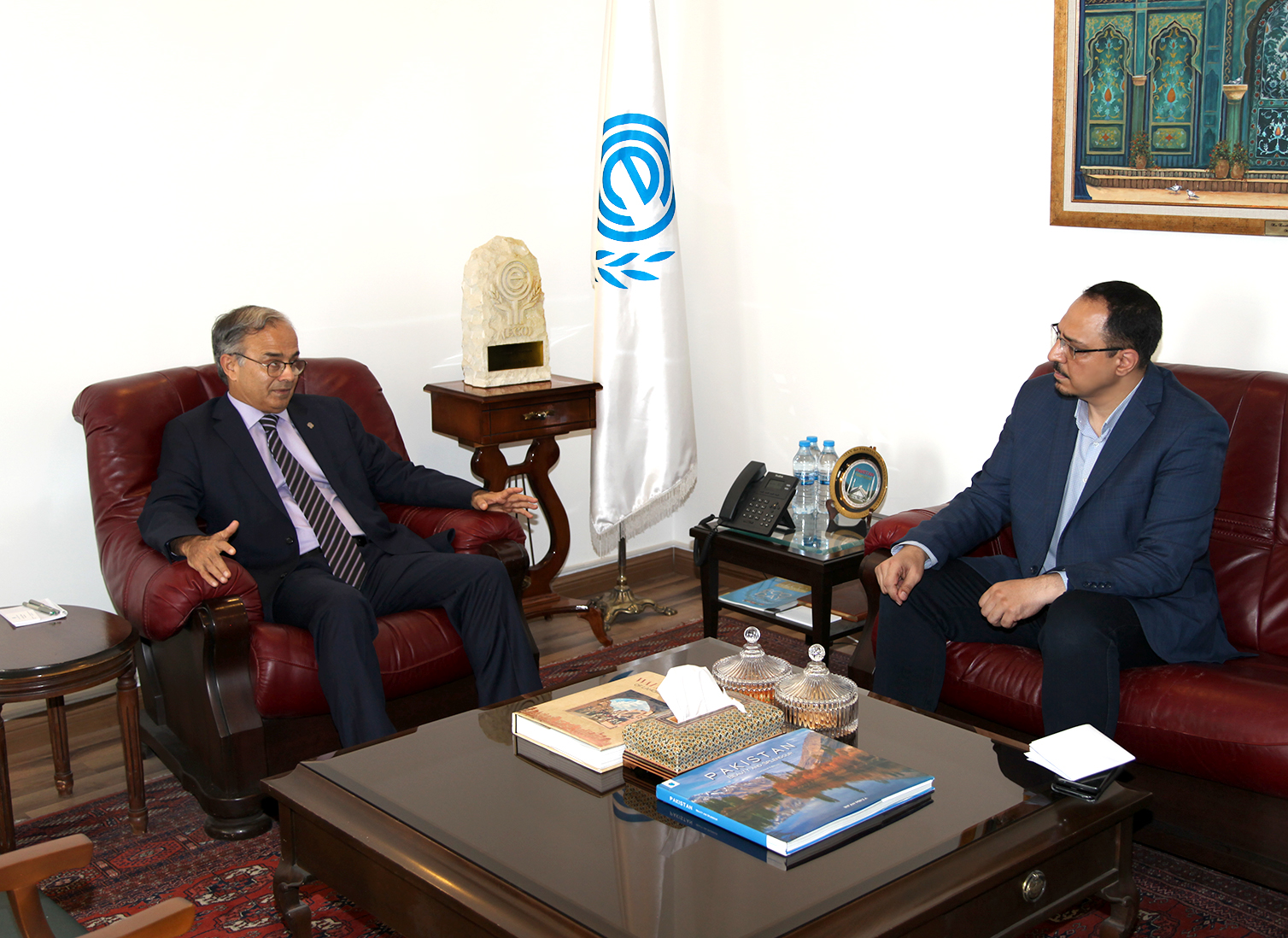 Although ECO does not yet have a formal, unified strategy for AI, we fully recognize its importance and are taking meaningful steps to integrate AI into our broader regional development agenda. ECO is actively laying the groundwork for AI to play a transformative role in advancing sustainable, inclusive, and integrated regional development. Our approach is focused on capacity building and technical cooperation, ensuring that all Member States—regardless of their current digital capabilities—can participate in and benefit from AI advancements. ECO also promotes cross-border research and innovation, particularly in areas such as smart agriculture, energy management, and climate monitoring. To further shape a structured roadmap for AI adoption, ECO plans to host a regional AI-focused roundtable, bringing together policymakers, private sector leaders, and researchers. This initiative will foster collaboration and partnerships, including with international organizations like the ITU’s “AI for Good” initiative and the Digital Cooperation Organization.
Although ECO does not yet have a formal, unified strategy for AI, we fully recognize its importance and are taking meaningful steps to integrate AI into our broader regional development agenda. ECO is actively laying the groundwork for AI to play a transformative role in advancing sustainable, inclusive, and integrated regional development. Our approach is focused on capacity building and technical cooperation, ensuring that all Member States—regardless of their current digital capabilities—can participate in and benefit from AI advancements. ECO also promotes cross-border research and innovation, particularly in areas such as smart agriculture, energy management, and climate monitoring. To further shape a structured roadmap for AI adoption, ECO plans to host a regional AI-focused roundtable, bringing together policymakers, private sector leaders, and researchers. This initiative will foster collaboration and partnerships, including with international organizations like the ITU’s “AI for Good” initiative and the Digital Cooperation Organization.
What policies and mechanisms are envisaged to support and empower small and medium-sized enterprises (SMEs) and startups in ECO member countries?
We actively promote the development of startup ecosystems across the ECO region. One important recommendation that came out from the Youth Forum held during the 17th ECO Summit in Aghdam was the establishment of an ECO Youth Entrepreneurship and Startup Fund, a regional financing mechanism designed to empower early-stage ventures with seed funding, certification, and access to public procurement. This will be formally considered for adoption soon. Pursuant to the ministerial decision in Mashhad during the 28th Meeting of the ECO Council of Ministers, we are also considering the proposal to establish an ECO Directorate of Information Technology and Digital Innovation to further institutionalize support for startups, digital trade, and tech-driven entrepreneurship across the region.
Is there a plan to develop a regional strategy for clean energy within the ECO framework?
Certainly, we need to advance our regional energy agenda which necessitates enhanced ownership and active engagement of all stakeholders in view of the rapidly evolving global energy landscape. The success of implementation of “ECO Strategy for Energy Cooperation 2030” hinges on the commitment Member States to translate its vision into tangible actions. The ECO Clean Energy Centre (CECECO) in Baku serves as a catalyst for these transformative efforts. CECECO aims to create an enabling environment for renewable energy and energy efficiency markets, fostering investments in these sectors. The Charter of CECECO has already been signed by six Member States and we anticipate broader participation to further strengthen this important project and accelerate the region’s sustainable energy transformation.
How does ECO address the development challenges in Afghanistan while pursuing inclusivity in its regional programs?
Afghanistan is an important ECO member and is a vital transit hub in the region. We were happy to see the Deputy Prime Minister of Afghanistan joining the 17th ECO Summit in Azerbaijan and reaffirming Afghanistan’s commitment to ECO goals and objectives. With the incremental revival of engagements with Afghanistan duly endorsed by Member States, we look forward to exploring ways for deepening cooperation with Afghanistan under ECO framework.
Are there any plans to expand the membership of observer countries or establish new cooperation with non-ECO member states?
ECO is committed to deepening its engagement with countries, as well as regional and international organizations. To this end, several special guests representing states and international organizations were invited to the 17th ECO Summit. The ECO has three observers and currently we have any pending application for observership. We actively collaborate with representatives of foreign countries based in Tehran to explore opportunities for cooperation. Also, we have strengthened our interactions with international organizations and non-ECO countries, further expanding our network of partnerships and fostering regional and global collaboration.
What concrete actions has ECO taken so far to promote gender equality and women’s economic empowerment across its member states?
Women are important and integral part of all national development efforts. We see them as important stakeholder in advancing ECO’s development agenda. With this in view, the First ECO Women Forum, themed “Enhancing the Role of Women for Building a Sustainable and Climate-Resilient Future,” was held during the ECO Week of the 17th ECO Summit, where women leaders from across the region and international organizations shared insights on mainstreaming women in development efforts. The Forum called for integrating women’s voices into policymaking and strengthening their leadership. The forum also highlighted the importance of women’s perspectives in shaping the “Strategic Objectives of Economic Cooperation 2035”.
How does ECO coordinate with other international organizations, such as the Shanghai Cooperation Organization and the Eurasian Economic Union, to avoid overlaps and enhance synergies?
We believe that regional cooperation and building synergies is much needed and desirable for avoiding duplication and overlaps in advancing regional development agenda. With this in mind, we are ready to initiate conversations with regional and international organizations including SCO and EEU to synergizing our work and enhancing our collaboration to amplify the impact of our collective efforts.
What key performance indicators (KPIs) does ECO use to measure its success? Do indicators such as trade volume, investment in infrastructure, or institutional reforms play a role in this assessment?
Implementation has been a challenge for us in ECO, which is why we place high priority on addressing implementation related issues. In fact, this is part of the ECO’s reform agenda. We have processes and mechanisms including ministerial meetings that evaluate the work and performance of the Organization. However, no formal KPIs have been developed so far. This is something, we believe, must be looked at to achieve effective implementation.
Since the beginning of your tenure, what development or change of attitude in the political will of member states to deepen regional cooperation has stood out most to you?
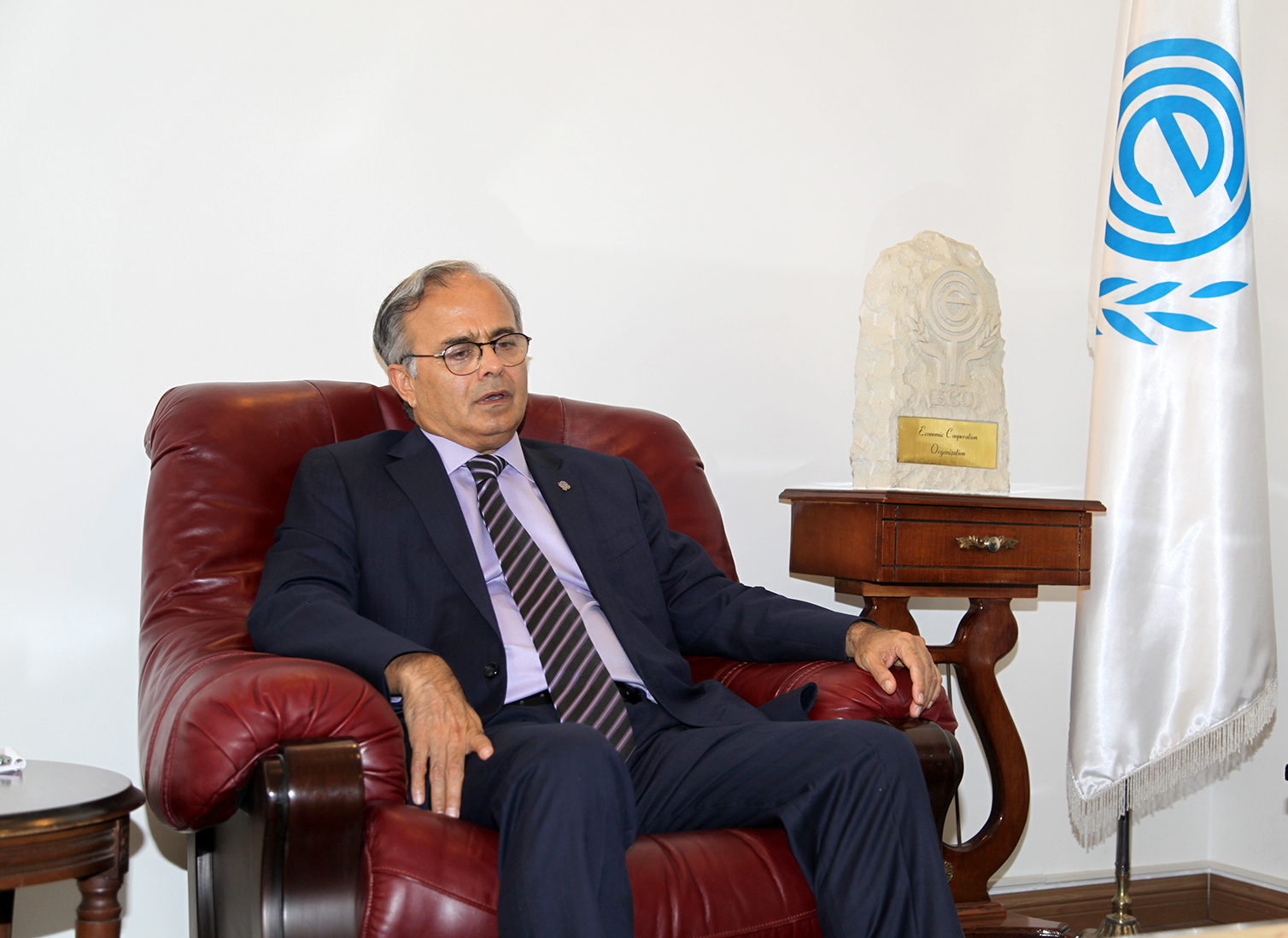 Since the beginning of my tenure, what has stood out most is a clear and growing convergence and the political will of ECO Member States toward deeper and more result-oriented regional cooperation. The great chemistry between the leaders on full display during the 17th ECO Summit, made the occasion a moment of opportunity for ECO. We clearly witnessed a renewed sense of urgency and shared purpose among the leaders, particularly in aligning national priorities with broader regional goals. We also see a stronger commitment to institutional reform, enhanced implementation of ECO agreements, willingness to convene ministerial meetings, and a greater openness to inclusive dialogue. This collective mindset marks a significant shift, from rhetoric to action, laying a solid foundation for realizing the vision of a more integrated, stable and prosperous ECO region.
Since the beginning of my tenure, what has stood out most is a clear and growing convergence and the political will of ECO Member States toward deeper and more result-oriented regional cooperation. The great chemistry between the leaders on full display during the 17th ECO Summit, made the occasion a moment of opportunity for ECO. We clearly witnessed a renewed sense of urgency and shared purpose among the leaders, particularly in aligning national priorities with broader regional goals. We also see a stronger commitment to institutional reform, enhanced implementation of ECO agreements, willingness to convene ministerial meetings, and a greater openness to inclusive dialogue. This collective mindset marks a significant shift, from rhetoric to action, laying a solid foundation for realizing the vision of a more integrated, stable and prosperous ECO region.
How have you taken advantage of your diplomatic background and international relations network to enhance the status of ECO?
Obviously, my experience and background come in handy in helping me to do the job I have been tasked. For me, clearly, bringing the region together is a mission rather than just a job. I am committed to doing by best to advancing ECO’s agenda of regional integration.
Given that the Islamic Republic of Iran has declared its readiness to host the next Summit of ECO Heads of State, what priorities and topics would you recommend for the summit, and in which areas has Iran demonstrated the highest level of cooperation with ECO so far? Additionally, how do you assess the prospects for strengthening relations and expanding bilateral cooperation between Iran and the organization?
Iran’s offer to host the 18th Summit was warmly welcomed by the leaders at the 17th Summit. This would be the fourth time for Iran to host the ECO Summit. Iran has made outstanding contributions to the work of the Organization across all areas of regional cooperation. Iran hosts the ECO Secretariat and several subsidiary agencies—including the ECO Cultural Institute, ECO College of Insurance, ECO Institute of Environmental Science and Technology, ECO Regional Center for Risk Management of Natural Disasters, ECO Regional Institute for Standardization, Conformity Assessment, Accreditation and Metrology (RISCAM), ECO Veterinary Commission (ECO-VECO), and ECO Regional Centre for Cooperation of Anti-Corruption Agencies and Ombudsmen (RCCACO). All this places Iran in a unique position to be the political champion for closer regional integration and development cooperation under ECO framework. Our goals and objectives as ECO are very much in sync with Iran’s own national commitment to and policy of friendly neighborhood. We look forward to working closely with Iran to develop a substantive and meaningful agenda focusing on trade expansion, transport integration and technological collaboration for the 18th ECO Summit.


